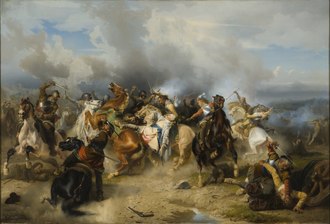Melee


A melee (/ˈmeɪleɪ/ or /ˈmɛleɪ/, French: mêlée, (French: [mɛle])) or pell-mell is disorganized hand-to-hand combat in battles fought at abnormally close range with little central control once it starts.[1] In military aviation, a mêlée has been defined as "an air battle in which several aircraft, both friend and foe, are confusingly intermingled".[2]
History of the term
[edit]The term melee originates in the 1640s from the French word mêlée, which refers to disorganized hand-to-hand combat, a close-quarters battle, a brawl, or a confused fight; especially involving many combatants.[3][4][5]
In the 1579 translation of Plutarch's Lives of the noble Grecians and Romanes, Sir Thomas North uses the term 'pelmel' to refer to a disorganized retreat.[6] The phrase was later used in its current spelling in Shakespeare's Richard III, 1594:
"March on, ioine brauelie, let vs to it pell mell, / If not to heauen then hand in hand to hell."
The phrase comes from the French expression pêle-mêle, a rhyme based on the old French mesler, meaning to mix or mingle.[6][7]
The French term melee was first used in English in c. 1640 (also derived from the old French mesler,[8] but the Old French stem survives in medley and meddle).[1]
Lord Nelson described his tactics for the Battle of Trafalgar as inducing a "pell mell battle" focused on engagements between individual ships where the superior morale and skill of the Royal Navy would prevail.[9]
The 1812 tabletop war game Kriegsspiel referred to the hand-combat stage of the game as a melee.[10] Later war games would follow this pattern.[11][12][13] From there, gamers would eventually begin to call the weapons used in that stage melee weapons.[14][15]
Melee weapons
[edit]A melee weapon, also called a hand weapon, close combat weapon or fist-load weapon, is any handheld weapon used in hand-to-hand combat, i.e. for use within the direct physical reach of the weapon itself, essentially functioning as an additional (and more effective) extension of the user's limbs. By contrast, a ranged weapon is any other weapon capable of engaging targets at a distance beyond immediate physical contact.[16]
Usage in sport
[edit]In Australian Rules Football, the term "melee" is used by the Australian Football League, sports commentators and journalists as a polite term for a brawl or fighting during a football match,[17] where football players physically attack. Melees often start as verbal disagreements between a small number players from the opposing teams, but can quickly escalate into many players from both teams joining in with this physical scuffle.[18]
See also
[edit]Notes
[edit]- ^ a b OED 2015.
- ^ Kumar, DeRemer & Marshall 2004, p. 462.
- ^ "the definition of melee". Dictionary.com. Archived from the original on 2 March 2021. Retrieved 10 June 2017.
- ^ "Definition of MELEE". Merriam-Webster. Archived from the original on 2 March 2021. Retrieved 10 June 2017.
- ^ Oxford English Dictionary. 2015. mêlée. "A battle or engagement at close quarters, a skirmish; a confused struggle or scuffle, esp. one involving many people. Also hist.: a tournament involving two groups of combatants."
- ^ a b "'Pell-mell' - the meaning and origin of this phrase".
- ^ "Pell-mell". 26 July 2021.
- ^ "Melee". 29 November 2021.
- ^ Fremont-Barnes 2005, p. 38.
- ^ W. R. Livermore (1882). The American Kriegsspiel (PDF). Riverside Press, Cambridge. p. 105. Archived (PDF) from the original on 2020-06-04. Retrieved 2019-08-14.
The first point to be considered is the number of combatants on either side and the relative advantages under which they are fighting; the second the losses and duration of the melee
- ^ H.G. Wells (1913). Little Wars. Frank Palmer Publishing.
We did at last contrive to do so ; we invented what we call the melee, and our revised rules in the event of a melee will be found set out upon a later page
- ^ Trevor Timpson (August 3, 2013). "Little Wars: How HG Wells created hobby war gaming". BBC News. Archived from the original on October 7, 2017. Retrieved October 6, 2017.
- ^ Luke Plunkett (September 18, 2012). "HG Wells Practically Invented Modern Tabletop Wargaming". Kotaku. Archived from the original on October 7, 2017. Retrieved October 6, 2017.
- ^ "Interview with Gary Gygax". Gamebanshee. Archived from the original on 2009-02-03.
- ^ Michael J. Tresca (November 10, 2010). The Evolution of Fantasy Role-Playing Games. McFarland. ISBN 9780786460090. Archived from the original on March 27, 2023. Retrieved October 27, 2020.
- ^ Michele Byam (2010-11-30). Arms and Armor, Discover the story of weapons and armor-from Stone Age axes to the battledress of samurai warriors. New York: Dorling Kindersley.
- ^ "Laws of Australian Rules Football, 2019 - page 8" (PDF). Australian Football League. 4 December 2019. Retrieved 2 April 2022.
- ^ AFL Melees: Pies, Cats, Port, Dons, Demons and Tigers, retrieved 2022-04-02
References
[edit]- Fremont-Barnes, Gregory (2005), Trafalgar 1805: Nelson's Crowning Victory, Osprey Publishing, p. 38 38, ISBN 978-1-84176-892-2
- Kumar, Bharat; DeRemer, Dale; Marshall, Douglas (2004), An Illustrated Dictionary of Aviation, McGraw Hill Professional, p. 462, ISBN 978-0-07-178260-9
- "mêlée n.", Oxford English Dictionary (online ed.), Oxford University Press, March 2015
